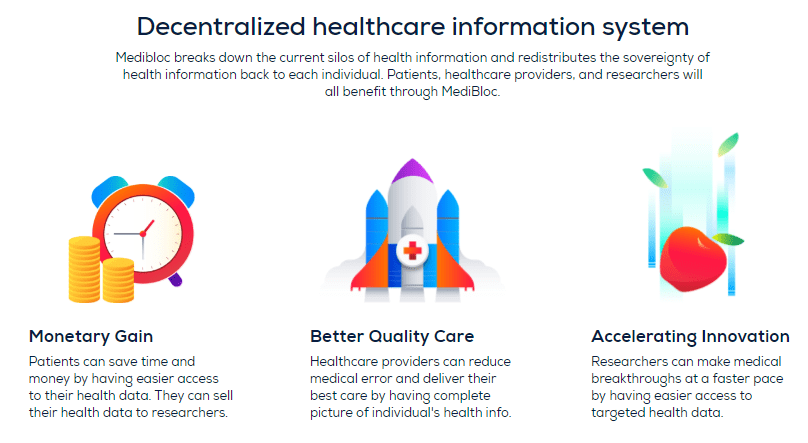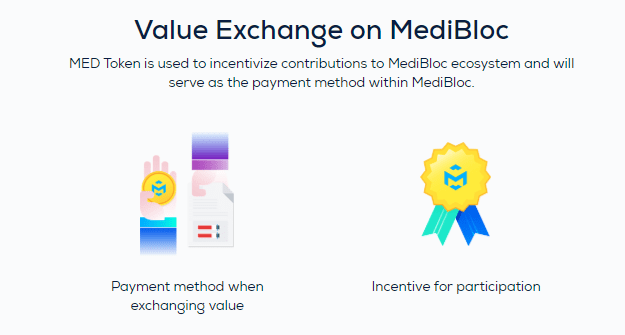The blockchain technology has been applied in a number of sectors of the economy, one of such sectors being the staid healthcare sector. From management and security of medical data to facilitating clinical trials and medical research, blockchain is clearly the revolutionary technology that can transform the healthcare industry both for the healthcare providers and the patients. Blockchain in healthcare has been effected by a number of technologies and MediBloc is the newest of such technologies.
What is MediBloc?
MediBloc is a blockchain powered data management system focused on the healthcare data system. In healthcare, medical data belonging to patients are dispersed and scattered across a number of healthcare providers and institutions across states and countries. Essentially, as a patient, every new doctor you see in every new hospital in every new town, city or country has a piece of your medical history. Healthcare devices and gadgets that analyse and take in data also hold a bit of your medical data in their storage system.
Scattered across various platforms and locations, it would be very difficult if not nearly impossible for a healthcare provider to obtain a full and complete record of one’s medical history for the most accurate diagnosis or the most efficient course of treatment as the case may be. MediBloc provides a data integration system that assembles every bit of medical information on a patient with real-time updates for every new entry into the system such that at any point in time, the system can be accessed for a patient’s comprehensive medical history.
How does MediBloc work?
MediBloc isn’t just a blockchain enabled medical information system, it is a blockchain enabled patient-centered medical information system. In essence, MediBloc puts the patients in total control of their medical records which is to be kept confidential according to HIPPA regulations. With MediBloc, only the patients have the authorized access to their medical data as the private key to unlocking and decrypting confidential medical data is given to the owner of the data alone. In other words, the patients alone are granted decrypted access to their personal medical data, and they are at liberty to share their data where they want. This patient information management concept will help to substantially reduce the rate of the exploitation of patients’ healthcare data and every means of unauthorized use of patients’ information stored in the MediBloc database by meddling third parties.

Beyond putting patients in control, MediBloc also provides a secure and transparent data storage system banking on the immutability of the blockchain database – every new entry to the system comes with a location and time stamp, a track record of how the information so accessed is utilised in addition to back up protocol in case the original data is ever lost.
Also, not only does MediBloc keep a record of patient’s data from medical institutions, medical information acquired outside a health facility – can also be stored on the system.
As an open source platform, applications can be developed and connected to the system for the purpose of data transfer. Data which can be available in diverse formats – text, images etc. MediBloc provides API and SDK programs that lets users create more data formats on the system in case the data to be uploaded isn’t supported by any of the already existing formats. Altogether, MediBloc provides a flexible, scalable and user-friendly medical data system for users.
How did MediBloc begin?
The conceptualization of MediBloc emanated from the need to create a patient centered healthcare ecosystem, one that will cater for the interoperability, security and privacy of medical information in the healthcare ecosystem. Thus, on the 17th of October 2017, the MediBloc White Paper was published, released via a Proof of Concept application. Exactly two months after the White Paper was released, on the 17th of December, the research and design for the mobile app version of MediBloc was initiated. Not only is the app intended to simplify operability and enhance the efficiency of the platform, it is also intended to enrich the MediBloc ecosystem and encourage other developers to utilise the SDK program as provided by MediBloc to build and develop apps for the system.
Who is the Founder of MediBloc?
MediBloc is the brainchild of two doctors – Dr. Allen Wookyun Kho and Dr. Eunsol Lee – who decided to develope a blockchain enabled data exchange service with the aim of providing an efficient information system for patients, doctors and researchers. While both doctors have extensive experience as software engineers, Dr. Kho, who once worked as the lead software engineer for Galaxy S with specialization in the field of peer-to-peer network at Samsung Electronics made a career change later in life to become a dental surgeon and practiced medicine for a few years. Dr. Lee on the other hand is a certified physician specializing in radiology and biomedical informatics. The co-founders are supported by a team of fellow software engineers, developers and blockchain researchers with sufficient experience and qualifications to build an efficient system.
The MED Token and ICO
The MediBloc system has two tokens – MED and MEDX. MED, the initial token to be launched was released on the QTUM network, thus, MED was released as a QRC token. However, with the development and advancement of the MediBloc system, the MediBloc development team decided would be ideal to build their own blockchain platform in order to optimize their service. Having a native blockchain platform will enhance the security system and the general efficiency of the MediBloc platform.
The new blockchain will also put the MediBloc development in complete control of their services and if latter in the future there is need to expand to other platforms and improve services, the blockchain will allow for that flexibility. This is what initiated the creation on MEDX, an ERC-20 standard token. The move to the Ethereum network is a tactical one with the aim of improving business versatility.
However, as there are already holders of MED tokens in the system, to protect the right of the token holders, holders of MED were airdropped MEDX at a 1:1 ratio. In other words, at the release of the mainnet, holders will get 0.5 MainNet coins per MED and 0.5 MainNet coins per MEDX. The token will serve as the primary medium of exchange between all users within the MediBloc ecosystem from the healthcare providers (institutions and personnel) to data researchers (medical devices, sensors and researchers). MED will also be used to incentivize user participation on the platform.
The initial coin offering of MED tokens was effected to raise funds for further development of the Medicare ecosystem. The ICO was held in three stages; the first and second presale ICO and the main crowdsale. The total issuance amount for the token sale was 10 million MED of which 50% – being 5 million MED were allocated for the token sales. The remaining 50% were distributed thus;
- 20% – Founding team
- 12% – Business development
- 10% – Early Investors and advisors
- 8% – Research
The ICO of MED was successfully brought to a conclusion on the 15th of December 2017 with about 6,200 investors from over 70 countries across the globe. The token sale generated about $30 million from almost 3 million MED tokens distributed to investors. MED was listed for trade on cryptocurrency exchanges on the 20th of December 2017 and a month after, on January 20th 2018, the unsold tokens were burned in the system.

For the ICO generated funds, the distribution structure is as follows;
- 50% – Promotion, platform development and expansion
- 30% – Transfer of Medi Points to Medi Tokens
- 20% – Operation and maintenance
However, with the introduction of MEDX, an ERC-20 compliant token based on the more widely accepted Ethereum network, the MediBloc team decided to also list the MEDX tokens on cryptocurrency exchanges, so as to not put holders of MEDX at a disadvantage. On June 4th MEDX token was officially listed on DEx.top – a decentralized Ethereum-token exchange platform developed as an auxiliary of Bitmain exchange. June 19th saw to a new listing of MEDX on Kryptono exchange. Kryptono a newly developed global crypto exchange specializing in the security and protection of users’ assets. The exchange supports both crypto-to-crypto and crypto-to-fiat exchanges via a peer-to-peer network.
Ways to Earn MediBloc – MEDX airdrop
MediBloc is hosting a MEDX airdrop to reward investors for holding MED tokens. Every token holder of MED whether on exchanges, in a QTUM wallet or in any other wallet is eligible for the airdrop. To qualify, a token holder would have taken a MED snapshot on June 1st 2018 – Korea time 00:00 (UTC+9), QTUM Block number(163890). Qualified token holders can then request for an airdrop and the system will automatically credit their QTUM wallet with an equivalent amount of MEDX as displayed on the snapshot. Token holders with holdings in a wallet other than a QTUM Core wallet will be required to pay additional fees to verify ownership of the wallet and its assets before the tokens will be credited to their accounts. Payouts for successful airdrop requests started on the 8th of June 2018.
Investing in MediBloc
In it’s course to do the utmost for the healthcare system and make progress as a platform, MediBloc has gone into strategic partnerships with a number of institutions in the healthcare and financial sectors. Under healthcare, MediBloc is partnership agreements with about four big medical facilities namely – Kyung Hee University Dental Hospital, Oracle Medical Group, Hanyang University Medical Center and Bestian Foundation and FineInsight. Hospitals in the partnerships will have their medical record system incorporated into MedicBloc’s blockchain database along with the development and implementation of new and improved business models for digital healthcare.
In the financial sector, MediBloc is in notable partnerships with PolicyPal Network and Deloitte Anjin LLC. PolicyPal Network is a decentralized insurance platform that aims to provide better accessibility to the insurance system to consumers by using data to bridge the gap between insurance institutions and its customers. This collaboration is expected to provide MediBloc with health insurance via PolicyPal’s CryptoProtect insurance. Deloitte on the other hand is a global accounting and consulting firm. The tech partnership with MediBloc will help Deloitte develop and invest in blockchain based projects around Korea. Altogether, these partnerships are expected to create synergies and advance the standardization of the MediBloc platform.
All investors/token holders of the MED tokens will have a share of the MED pool from where the allocated tokens are pulled from. Token allocation to token holders will be conducted on yearly basis with 5% and 3.5% inflation rates on the first and second years respectively and will be terminated after a period of ten years. Also, MediBloc provides its users with 1GB of free storage and 1GB per month of bandwidth for which they will be required to pay for via MED tokens to Storj, the data service provider.
Conclusion
The objective of MediBloc is to build a patient-centered healthcare ecosystem where data is secured, disintermediated, incorruptible and can be safely distributed. Having a decentralized information system will substantially reduce the rampancy of data leaks while empowering the patients with their confidential medical data.
MediBloc Community : http://bit.ly/medibloctelegram
MediBloc Website : http://bit.ly/mediblocwebsite
MediBloc Blog : http://bit.ly/mediblocblog



































